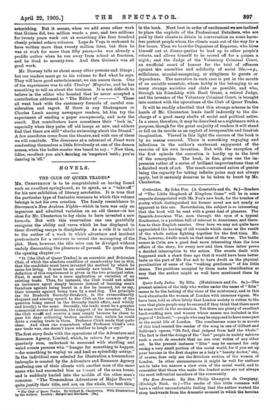NOVELS.
THE CLUB OF QUEER TRADES.* Mn. CHESTERTON is to be congratulated on having found such an excellent springboard, so to speak, as a " take-off " for his new exhibition of literary acrobatics. It is true that the particular type of fantastic romance to which this volume belongs is not his own creation. The family resemblance to
Stevenson's New Arabian Nights—which in turn was only an ingenious and admitted variation on an old theme—is too close for Mr. Chesterton to lay claim to have invented a new formula. But with this reservation one can gratefully recognise the ability and verve which be has displayed in
these diverting essays in discipleship. As a rule it is unfair to the author of a work in which adventure and incident
predominate for a reviewer to reveal the mainspring of the plot. Here, however, the idde mare can be divulged without unduly discounting the pleasures of perusal. To quote from the opening chapter :— " It [the Club of Queer Trades] is an eccentric and Bohemian Club, of which the absolute condition of membership lies in this, that the candidate must have invented the method by which he earns his living. It must be an entirely new trade. The exact definition of this requirement is given in the two principal rules. First, it must not be a mere application or variation of an existing trade. Thus, for instance, the Club would not admit an insurance agent simply because instead of insuring men's furniture against being burnt in a fire he insured, let us say, their trousers against being torn by a mad dog. The principle (as Sir Bradcock Burnaby-Bradcock, in the extraordinarily eloquent and soaring speech to the Club on the occasion of the question being raised in the Stormby Smith affair, said wittily and keenly) is the same. Secondly, the trade must be a genuine commercial source of income, the support of its inventor. Thus the Club would not receive a man simply because he chose to pass his days collecting broken sardine tins, unless he could drive a roaring trade in them. Professor Chick made that quite clear. And when one remembers what Professor Chick's own new trade was, one doesn't know whether to laugh or cry."
The first story deals with the operations of the Adventure and Romance Agency, Limited, which, in return for a yearly or quarterly sum, undertook to surround with startling and weird events persons who "hunger for something to happen, —for something to waylay us and lead us splendidly astray." In the individual case selected for illustration a tremendous imbroglio is created by the Adventure and Romance Agency
confusing one of their clients with another man of the same name who had succeeded him as t.nant of the same house, and is suddenly hurled into the middle of the other man's romance. "The Tremendous Adventures of Major Brown" quite justify their title, and are, on the whole, the best thing
• The Club of Queer Trades. By Gilbert B. Chesterton. With Illustrations by the author. London : Harper and Brothers. 16a3 in the book. Next best in order of excitement we are inclined to place the exploits of the Professional Detaihere, who are paid by their clients to detain in conversation on some harm- less pretext people whom the clients want out of the way for a few hours. Then we have the Organiser of Repartee, who hires himself out at dinner-parties to lead up to other people's retorts, and allows himself to be scored off for a guinea a night ; and the Judge of the Voluntary Criminal Court, an unofficial court of honour for the trial of offences against the amenities and solidarity of social life,—e.g., selfishness, seandal•mongering, or stinginess to guests or dependents. The narrative in each case is put in the mouth of an amiable eccentric, whose hobby is the belonging to as many strange societies and clubs as possible, and who, through his friendship with Basil Grant, a retired Judge, and the inventor of the Voluntary Criminal Court, is brought into contact with the operations of the Club of Queer Trades.
It will be readily admitted that this strange scheme in the hands of Mr. Chesterton lends itself indirectly to the dis- • charge of a good many shafts of social and political satire. In a sense, therefore, it may be described as a nightmare with a purpose, though for the great majority of readers it will stand or fall on its merits as an exploit of irresponsible and freakish imagination. Viewed in this light the success of the book is by no means assured. There is something engaging and infectious in the author's exuberant enjoyment of the exercise of his own invention. But with the exception of the first episode the execution is hardly up to the level of the conception. The book, in fine, gives one the im- pression rather of a series of brilliant improvisations than of a finished work of art. The much-canvassed axiom of genius being the capacity for taking infinite pains may not always apply, but it certainly deserves to be taken to heart by Mr. Chesterton.


































 Previous page
Previous page